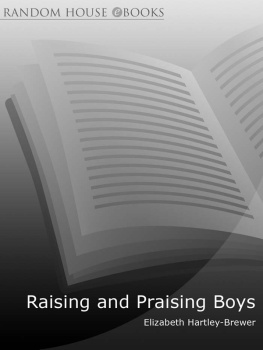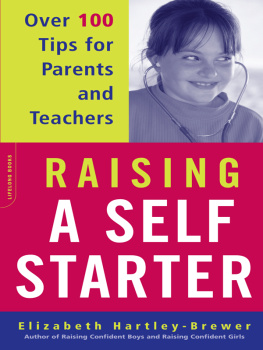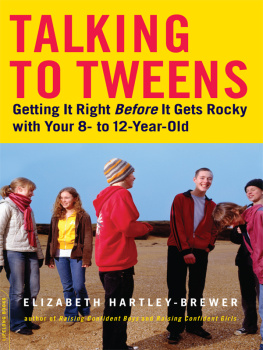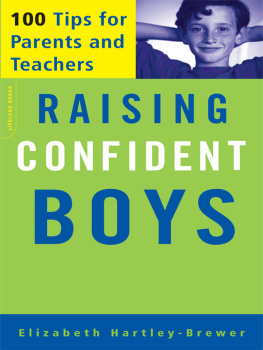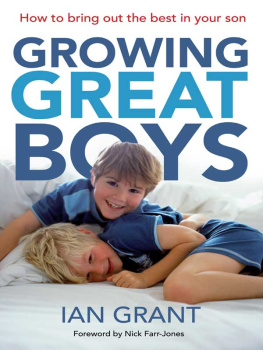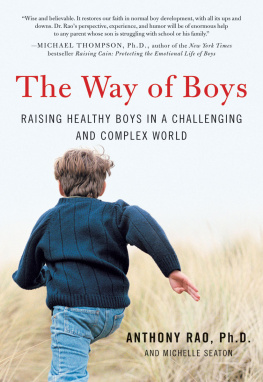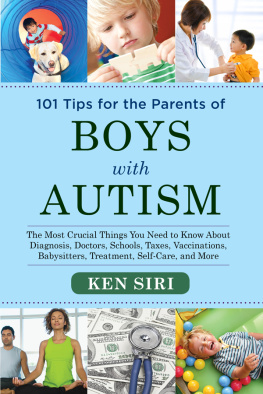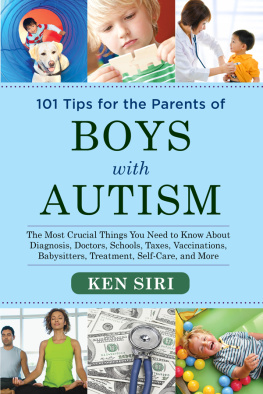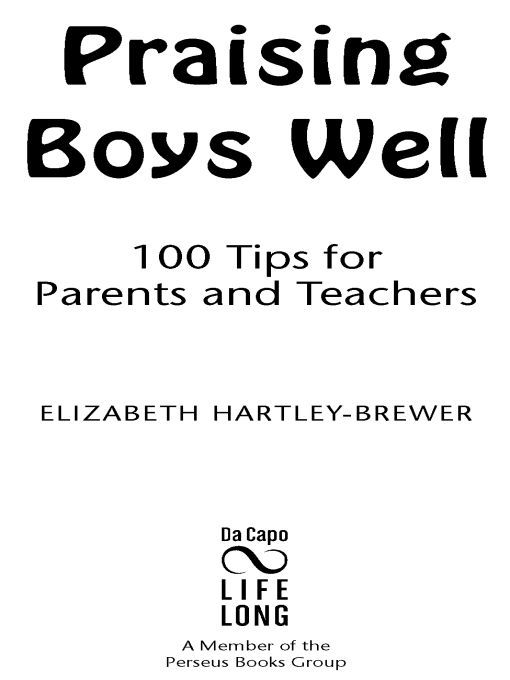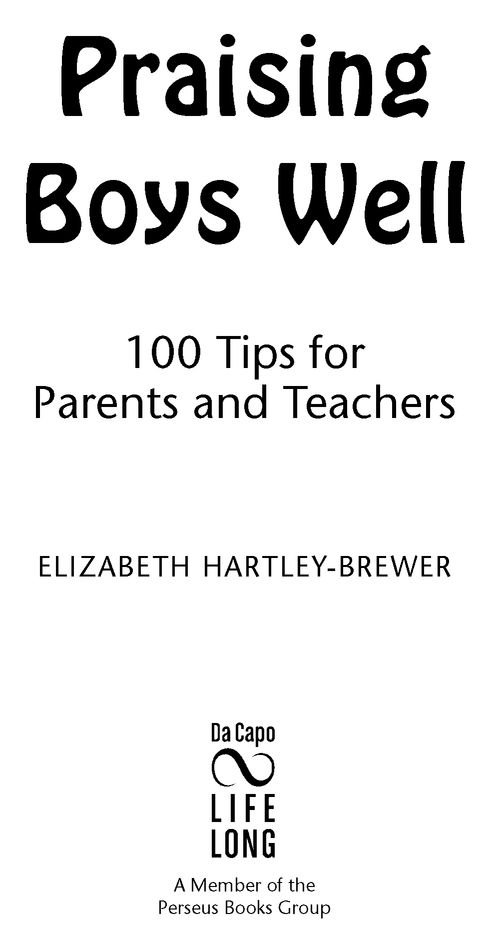Table of Contents
Other books available from Da Capo Press by Elizabeth Hartley-Brewer
Praising Girls Well
Talking to Tweens
Raising a Self-Starter
Raising Confident Boys
Raising Confident Girls
Raising Happy Kids
For Richard, with deep thanks for
his love and unswerving support
Introduction
This book is for parents with boys of any agebabies, toddlers, or teenagersand for teachers. Most of the tips can be used generally with any boy, but several relate to particular stages of development and show how our praise style should change as our boys grow. One of the most important lessons we have learned over the last two to three decades is how much children, regardless of their age, benefit from receiving praise from parents and teachers. Children respond far better to positive feedback and encouragement than they do to threats, criticism, and punishment. Many parents and teachers once found what they felt to be flattering words hard to use, especially with boys, and although some still find it hard, most people are now sufficiently familiar and comfortable with common phrases to give praise in good measure.
Praise has been viewed as the way to boost childrens self-esteem, and to help them feel confident, and to fulfill their potential and be at ease with themselves. Many dont realize that using praise also has wider benefits for individual children and for society, because it can help to encourage self-discipline and moral behavior. However, nothing about parenting or children is straightforward. Boys, for example, often react to praise in different ways from girls and need their confidence reinforced in different areas. We are also beginning to realize that if praise is overused, used for particular personal motives, or directed at the wrong kind of activity, it may actually be unhelpful. When praise is overused or overhyped or belies the truth, boys may either become praise-dependent and require constant affirmation and approval or become indifferent to praise. Another possibility is that they may start to mistrust either the message or the messenger, wasting everyones breath, or they might come to think theyre superclever and special and annoy people with their self-importance, when in truth theyre simply normal. Boys in particular can also feel swamped and suffocated by what they can experience as a continuous positive or negative commentary on their every move and are inclined to act out against the microscopic attention and constant judgment.
In addition, there is growing concern that overexposure to praise has led to children being ruined by rewards, dulled by dumbing down, incapacitated by anxiety, or, at the very least, easily wrong-footed when faced with real challenges. They may then hide their anxiety with diversionary displays of daring and bravado in other spheres. And theres the worry that boys might be softened by pampering. For praise to be reliably effective, we have to be careful to understand fully its pros and cons, its wider value, and the approaches that are safest given boys particular sensitivities.
This is what this book sets out to achieve. The early chapters (1-6) present the basic principles, tactics, and purposes. Chapter 1 develops an understanding of praise that underpins the thinking behind the one hundred tips that are spread equally among the remaining ten chapters. Chapter 4 enables readers to reflect upon the important features of child development and so relate the principles and tactics to the age and developmental stage of any particular boy. The later chapters (7-10) consider the subtleties and potential dangers of praise, and Chaper 11, the final chapter, invites the reader to self-reflect. Each tip stands alone and can be dipped into at random, but readers may like to read at least the introduction to each chapter in turn to gain an initial overview. This is a book to revisit on many occasions.
To show what this book covers, here are some questions and possible answers to consider. Think about why the different responses could matter.
When your son does particularly well, which might you say?
Im really proud of you for managing that!
I hope you feel proud of yourselfyou should.
You probably feel really proud to have achieved that.
I feel so proud of you and proud that youre my child.
If your son makes the school soccer team, would you... ?
Say, Great! How many others tried out for how many places?
Promise to continue trips to the soccer field or park to develop his skills further.
Go as a family to every match to give him support.
Attend yourself and shout encouragement from the sideline.
When your son tidies his room without being told, would you... ?
Give him a hug and bring him a treat to eat.
Say thanks, but laugh and say you wonder how long it will last.
Give him money and hope this will persuade him to carry on the good work.
Comment favorably on the improvement and ask what triggered the idea.
As you will discover in this book, praising well is a subtle art, and the way in which you phrase it can make a huge difference in whether a child feels freed and encouraged by your comments or, despite your good intentions, becomes anxious or angry because he senses a pressure to do even better. As you read through the one hundred tips that follow, you will come to appreciate the benefit of beginning most of your comments with you rather than I; of encouraging your son to judge his own efforts rather than rely on your view; of not taking any credit for his success; and of focusing on his reasons for and feelings about doing well, not yours.
Now read on!
Chapter 1
Understanding Praise and How Boys React to It
Children love praise; of course they do, for most of us thrive on compliments and appreciation. Despite the pleasure it gives, children should be praised for more than just the delight praise brings them or the help it gives them to try harder. Praise needs to be a central part of raising children because it meets most of their fundamental needs. In other words, praise is not merely a bit of luxury, some additional fancy wrapping that we can leave out if we prefer. Children need to feel important and significant to someone, to believe that someone cares enough to cherish them, and this is at least as important as being properly fed and clothed. Children need to feel secure and to trust and rely on that care, which they can when they feel valued and central to their carers life. They also need friendly and warm guidance, support, and direction about how they should lead their lives, so they need to hear what it is they should do rather than how they constantly fall short and disappoint. And in order for children to flourish, they need to know and be told they are capable, are enjoyed, and make others happyparticularly their parents.


